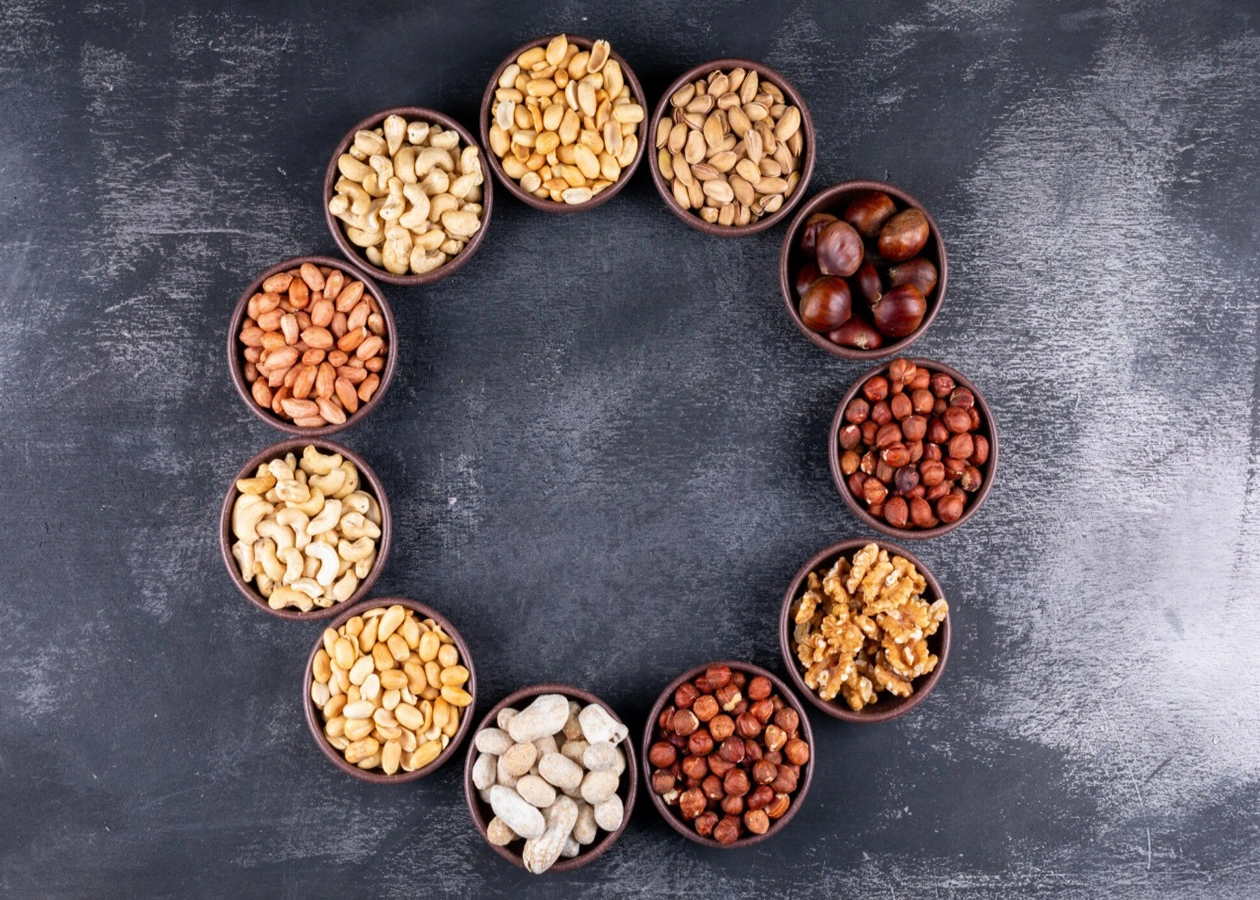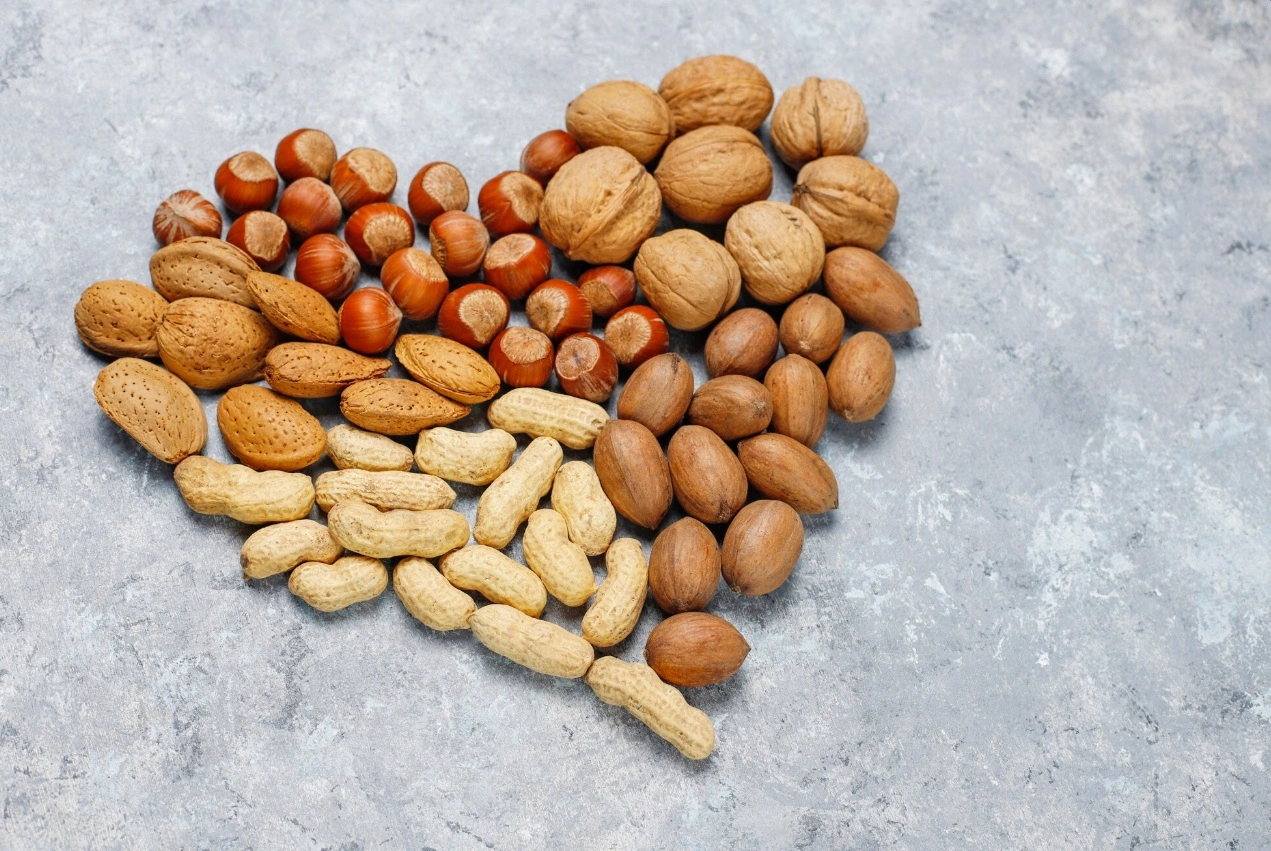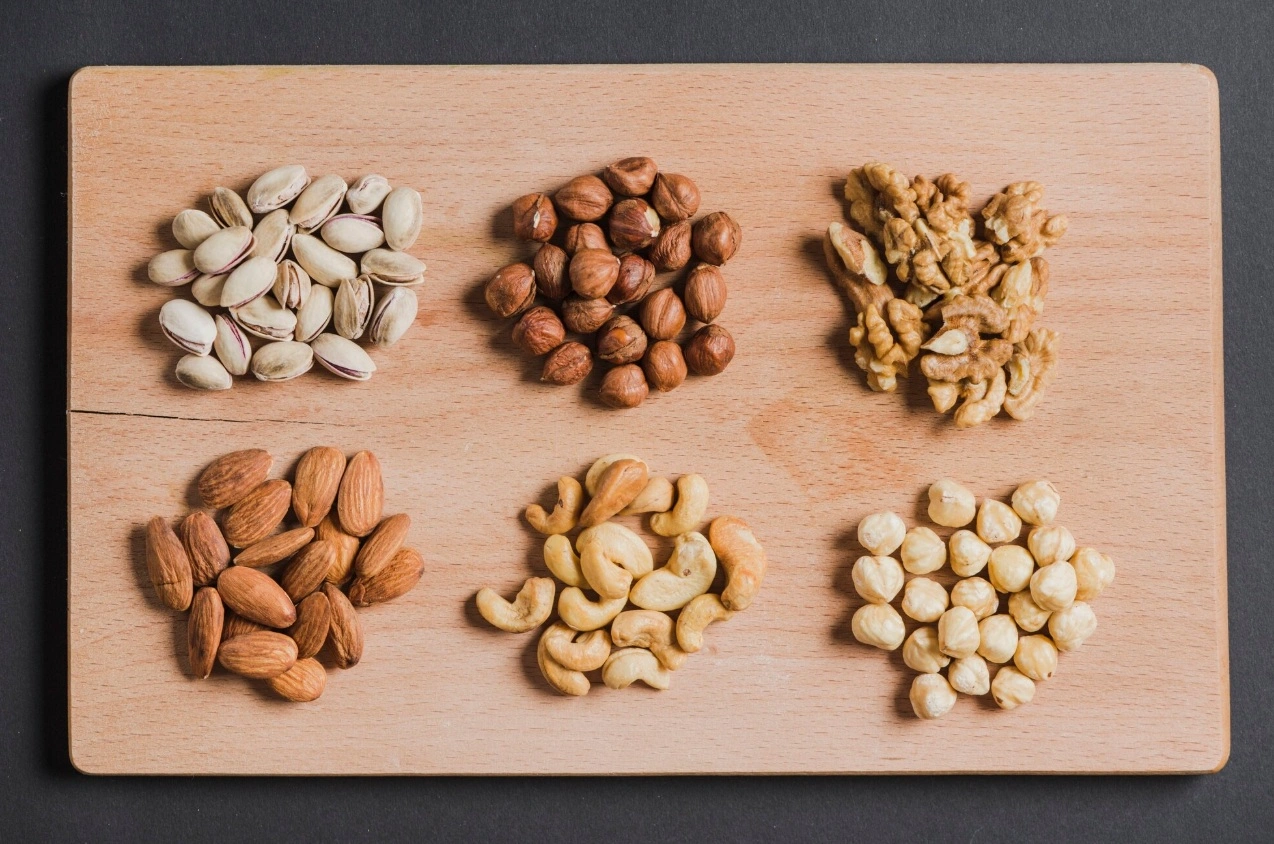
Nuts are one of the trickiest foods on a Ketogenic Diet. On the one hand, they contain healthy fats, protein, fiber, and micronutrients. On the other hand, their carbohydrate content varies widely from one type of nut to another, making some Keto-friendly, while others can knock you out of ketosis with just a handful. So, let’s find out the lowest carb nuts and the best nuts for Keto.
The short answer is yes, every nut contains some carbohydrates. However, the important point is whether they are mostly fiber, which doesn’t raise blood sugar, or net carbs (total carbs minus fiber) [1] [2].
If you are following a Low-Carb Diet or Keto Diet, you need to track net carbs because this is what directly impacts ketosis.
It is also important to note that portion sizes matter. Nuts are delicious, and it is easy to overeat them. But nuts are calorie-dense.
For example, eating 4 ounces of almonds may not feel like much, but that is over 700 calories and nearly 12 grams of net carbs, which is too much for a low-carb Keto Diet [3].
To learn how much carbs, fat, and protein you need daily, you can use this free Carnivore Macro Calculator, which works for all low-carb diets, including Keto and Carnivore.
But do we have to eat nuts on a Keto Diet? What are the benefits of consuming low carb nuts?
Learn More: Intermittent Fasting 20/4: Results, Side Effects, and How to
Lowest carb nuts are good choices for Low-Carb or Keto diets because they provide healthy fats, protein, and fiber while keeping carb intake minimal [4].
These nuts help you stay in ketosis, the fat-burning state that helps you lose weight, lower inflammation, and improve your hormones, especially insulin.
Like other low-carb food sources, low-carb nuts can help provide:
By consuming the lowest carb nuts, you maximize the benefits of nutrient-rich whole foods while minimizing the risk of hidden carbs that could slow fat loss or kick you out of ketosis.
So, let’s learn which nuts have the lowest levels of carbohydrates, which help us gain all the health benefits while inducing and maintaining ketosis.
Learn More: The Carnivore Diet: What Are Its Benefits and Side Effects?

When deciding which nuts are truly the best for Keto, net carbs per ounce are an important factor, but not the only one.
The fat-to-carb ratio, micronutrient density, and satiety all play a role. Keto works by keeping carbs extremely low and replacing them with fats, so nuts with very high fat, moderate protein, and minimal net carbs are the best [11].
Before going into details, let’s take a look at the following table that compares the macros of the most common nuts per 1 oz. (28 g) serving.
Now, let’s learn more about the lowest carb nuts, which are the most Keto friendly nuts, and the highest-carb nuts, which are considered the worst Keto nuts.
Learn More: The Primal Diet: from Low-Carb Eating to Health and Fitness
The lowest carb nuts, which are considered the best nuts for Keto, include:
Pecans are probably the best Keto nuts. With only 1 gram of net carbs per ounce, so you can eat high amounts of them without increasing your carb intake [12].
In addition to their low carbohydrate levels, pecans are rich in monounsaturated fats and antioxidants such as ellagic acid, which can help reduce oxidative stress and inflammation.
Because of the buttery texture they have, they are perfect for making snacks or desserts, baking, or blending into pecan butter.
Brazil nuts are the second on the list of the lowest carb nuts, plus they are a rich source of selenium, a trace mineral that supports thyroid function and immunity [13] [14].
Just 1–2 Brazil nuts per day provide your daily selenium needs. Since you need to balance minerals on a Keto Diet, Brazil nuts can prevent deficiencies.
Although they are nutritious, you should be careful about overeating them. This is because you may gain too many calories. Also, too much selenium can be toxic.
Learn More: 28-Day Low-Carb Meal Plan Based on Your Calorie Goals
Macadamias are among the most favored nuts among those following low-carb diets like Keto for their highest fat content (21g per ounce or about 75%) and rich, creamy taste [15] [16].
They have an almost perfect Keto macronutrient profile: high fat, very low carbs (1.5 g net/oz), and just enough protein.
They are also high in palmitoleic acid, a rare monounsaturated fat that can support metabolic health. The only downside is their price, but in terms of keto macros, they are unbeatable! So, many people enjoy them as an occasional treat.

Walnuts, hazelnuts, almonds, and pine nuts are not the lowest-carb, and all fall into the moderate carb range. But they are better than some other nuts for those who follow a Keto Diet. Let’s see why!
Learn More: How to Start The Primal Diet in a Healthy and Effective Way?
Walnuts have only 2 g net carbs per ounce and are one of the best plant-based sources of omega-3 fatty acids, especially ALA (alpha-linolenic acid) [17].
This makes them a nutritious source to support heart and brain health, both of which can be stressed during diet transitions.
Hazelnuts provide around 2 g net carbs per ounce and are rich in vitamin E, a fat-soluble antioxidant that helps skin health and cellular protection. Their mild sweetness and special taste make them a yummy, Keto-friendly nut for baking and desserts [18] [19].
Learn More: Zero Carb Foods to Have on Keto and Carnivore Diets
Almonds are one of the most popular nuts worldwide and are generally Keto-friendly, but we should not overeat them [20].
They provide a balance of fat, protein, and fiber, with about 2.6 g net carbs per ounce (28 g). This makes them a good choice for snacking or making almond flour, which is a Keto-friendly alternative to wheat flour.
Almonds are also nutrient-dense, containing vitamin E, magnesium, and antioxidants. The fiber and protein content in almonds support satiety and control cravings [21].
However, you should note that almonds have more carbs than lowest carb nuts like macadamia or pecans, so eating too much can push you out of ketosis.
You should also be careful about almond-based products, like butter, flour, or milk, because they can add up in carbs if you don’t track portion sizes carefully.
Learn More: 28-Day Keto Meal Plan + Plans Based on Your Caloric Needs
Pine nuts contain around 3–4 g net carbs per ounce, which makes them higher-carb than other nuts we have talked about so far.
However, they are very rich in healthy fats, especially polyunsaturated fats, and contain essential minerals like magnesium and zinc [22].
Pine nuts are also high in pinolenic acid, which can suppress appetite and help fat metabolism. Their buttery taste makes them suitable for salads, dressings, and sauces, especially pesto [23].
So, pine nuts are allowed in small amounts as a garnish or in pesto, but not as a daily Keto snack. They are also more expensive than other nuts.
As mentioned earlier, not all nuts are Keto-friendly. Some have too high carbohydrate levels for a low-carb diet like Keto. Let’s find out if our favorite nuts are among the forbidden ones in a Ketogenic Diet.
Some nuts are not suitable for a Ketogenic Diet because of their high carbohydrate content relative to fat.
Keto dieters can typically use 20–30 grams of net carbs per day, so a single serving of some nuts can eat up half, or even all, of this amount.
Some of the nuts that are not suitable for Keto include pistachios, peanuts, cashews, and chestnuts.
Learn More: 15 Carnivore Diet Meal Plan Ideas + Free PDF Shopping List
Pistachios fall into a gray area because they provide about 5 grams of net carbs per ounce and are higher in carbs than most Keto-friendly nuts.
The issue with pistachios is portion control. Because they are small, easy to snack on, and often eaten by the handful, it is easy to double or triple the carb intake without noticing [24].
While pistachios do contain lutein and zeaxanthin, antioxidants beneficial for eye health, they are generally not worth the carb cost for those following a low-carb Ketogenic Diet [25].

Peanuts are technically not nuts; they are legumes in the same family as beans and lentils. That already makes them a bit different nutritionally compared to tree nuts.
Peanuts contain about 6 grams of net carbs per 1 oz. (28 g), which is higher than some Keto-friendly nuts like pecans or macadamias [26].
However, peanuts are relatively high in protein, providing about 7 grams per ounce, which can help satiety but may stimulate insulin more than fatty nuts.
Peanuts have around 14 grams of fat per oz., mostly monounsaturated and polyunsaturated fats, which are less stable than saturated or omega-3 fats in other nuts.
They also contain vitamin E, magnesium, and resveratrol, which is an antioxidant also found in red wine [27].
Since peanuts are Often eaten salted or roasted in vegetable oils, they can be inflammatory. Also, peanut butter can be very easy to overeat, leading to excess carbs and calories, which can harm fat loss.
Learn More: 30 High Protein Low Carb Lunch Ideas for Keto and Carnivore
Cashews contain about 8 grams of net carbs per ounce, meaning they have nearly as many carbohydrates as a slice of bread.
Their carb-to-fat ratio is also not as good as Keto-friendly nuts. Cashews have lower fat and higher starch content, meaning they spike blood sugar faster [28] [29].
While they are delicious and packed with magnesium and iron, you’d better steer clear of them on a Keto Diet unless you consume them in tiny amounts, as they can easily kick you out of ketosis.
Chestnuts are probably the worst choice for those who are on low-carb diets. Unlike most nuts, chestnuts are starchy rather than fatty.
A single ounce contains around 13–15 grams of net carbs and very little fat, making them nutritionally closer to grains than to Keto-friendly nuts [30] [31].
Because they lack the fat content that makes other nuts suitable for Keto, chestnuts have no place in a Ketogenic Diet.
Learn More: 20+ High Protein Low Carb Snacks for Keto and Carnivore Diet
If you are craving crunch but want to keep carbohydrates even lower, seeds are a practical alternative. You can use:
Learn More: Does Meat Have Carbs? The Truths That Carnivores Should Know
Nuts can be a healthy food source on a Ketogenic Diet if you choose them wisely. Pecans, macadamias, and Brazil nuts are the best choice. You can also use walnuts, and hazelnuts.
However, be cautious with peanuts, pistachios, and especially cashews, which are too high in carbohydrates and can negatively impact ketosis.
Always remember that portion size matters. Even the best Keto nuts can add up quickly if you don’t pay attention to what or how much you eat.
Learn More: Speed Keto Diet: What Is It and How Does It Work?
Let’s find answers to the most frequently asked questions about the lowest carb nuts.
Yes, nuts are generally Keto-friendly, but not all of them. Nuts like cashews and pistachios are higher in carbohydrates.
It depends on the amount of daily carbohydrates you can consume. Almonds contain about 2.9 g net carbs per ounce, so you can generally have them in moderation.
Not if you are on a low-carb Keto Diet, as they contain about 6 grams of net carbohydrates per ounce.
Not really. Pistachios contain around 5 grams net carbs per ounce. It is best to limit or avoid them unless you are on a more relaxed low-carb diet.
Learn More: The Best Low-Carb Pasta Types and Brands for Ketogenic Diets
No, cashews are a high-carb nut, with about 8 grams of net carbs per ounce.
Yes, they can be if only used in moderation. Walnuts provide about 2 grams of net carbs per ounce and are rich in omega-3s.
Pecan contain about 1 grams of net carbs per ounce, making them the lowest-carb nut.
Peanuts contain around 6 grams of net carbs per ounce.
Almonds contain around 2.6 grams of net carbs per ounce.
One ounce (about 14 halves) of walnuts contains about 4 grams of total carbs and 2 grams of net carbs.
Keto friendly nuts are those that are low in carbohydrates and high in healthy fats. Examples include pecans, walnuts, and macadamia nuts.
The best nuts for Keto are macadamia nuts, pecans, and Brazil nuts. They have the lowest net carbs per serving while being rich in fats and nutrients.